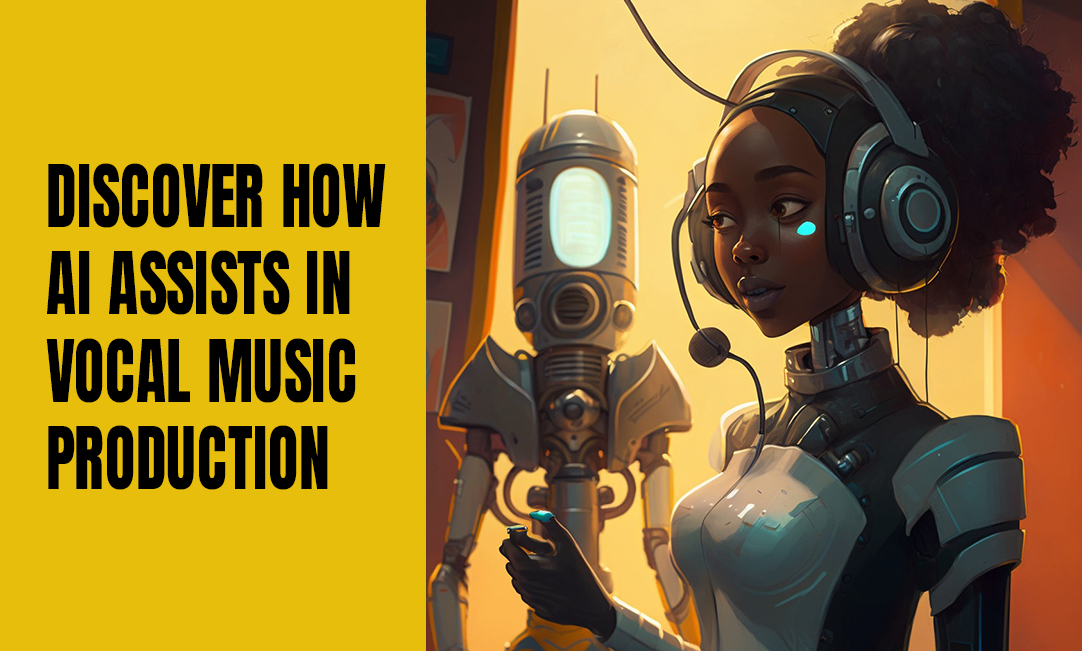Discover How AI Assist In Vocal Processing, Mixing, and Mastering

8-Aug-2023
Finding the ideal sound is an ongoing challenge in the world of music production. The incorporation of artificial intelligence (AI) in vocal processing, mixing, and mastering has been one of the most revolutionary technological developments in recent years, completely changing how we create and manipulate music. This potent fusion of human ingenuity and machine learning algorithms has created new opportunities, streamlined processes, and increased the caliber of music production to previously unheard-of heights. In this blog, we'll explore how AI mix and mastering is reshaping the music industry.
Advanced Vocal Processing
Audio enhancer software can provide audiophiles and professionals with the best possible sound experience. Using AI mix and mastering, you can easily remove background noise, apply effects of your choice, or use preset options to customize output for various devices such as speakers and headphones - all without modifying existing hardware.
AI vocal processors have been revolutionizing the audio industry for some time now, and this trend shows no signs of abating. AI-powered vocal processing technology improves sound quality by using advanced algorithms to push it beyond what was previously possible.
A crisp, clear listening experience can be achieved by using AI to reduce noise levels and refine sounds. There are many excellent AI-powered vocal processors available, and depending on your needs, you can utilize each one's unique features. AI audio enhancers are a fantastic option for audiophiles of all types, whether you're looking for a tool for professional music production or want something simple to use at home.
Below are examples of AI audio enhancers:
-
VEED: It removes background noise with a mouse click. The tool does away with the need to purchase noise-cancelling microphones and manually remove background noise. It has features like a simple user interface, sophisticated audio features, simple processing and easy to share on social media.
- Audo.ai: It allows users to quickly upload and edit sound files using its simple and intuitive user interface or even record them directly within the app. It is efficient for audio editors of all skill levels, whether they are beginners or seasoned. Additionally, its active development team is always working on new additions and updates, so you can take advantage of the tools they currently offer and upcoming upgrades.
Transforming the Mixing process
With the introduction of AI mix and mastering technology, music production has advanced significantly. These technologies help music producers and sound engineers to produce professional-quality mixes in less time. These software tools make it simpler than ever to get professional-level results because they include various AI-powered features like audio separation, pitch correction, frequency detection, voiceover, dubbing, and more.
The software analyses each song's individual tracks, including the vocals, bass, drums, and other instruments, and then applies algorithms to change the levels, EQ, and other settings to produce a more seamless and harmonious mix. Because it saves time and effort, the user can devote time to more creative processes.
Some of the best AI music-mixing software is:
-
LANDR: One of the most well-liked AI music mixing programs is LANDR. It analyses your music using AI algorithms to give a polished, professional sound. A complete package for aspiring music artists, it features automated mastering, mixing, and distribution.
- Amper Music: It is an AI music composition tool that enables users to make professional-caliber music tracks in a matter of minutes. Based on the user's inputs, its AI algorithms analyze musical tracks and create new melodies.
AI Mastering
AI mastering uses machine learning to analyze audio and then make choices regarding, among other things, stereo width, audio limiting, and equalization (EQ).
The objective is to create a song that is prepared to be shared and heard by your audience. This includes exporting the track in the appropriate file format and adjusting the loudness level so that it complies with industry standards.
You can release your track quickly using AI mastering services if you don't know how to master music or simply don't want to.
Here, we have excellent examples of AI music mastering tools that are well worth looking into.
-
Ozone 9: It is one of the most trusted tools by mastering engineers. It can intelligently handle loudness levels on the fly and automatically create EQs that match the frequency spectrum of your project. Ozone 9 offers a vast array of fine-tuning options for the skilled engineer in addition to its sophisticated brain.
- Leapwing DyeOne: With its discerning and intelligent attack and release settings, DynOne is able to extract the most from your mix right away. Your track can be tamed with the help of transparent and adjustable filters, five bands of high-quality parallel compression, and Leapwing's smart dynamics controller.
Beyond Assistance: AI as a Creative Partner
While AI mix and mastering has primarily served as a supportive assistant in vocal processing, mixing, and mastering, there are some exciting developments in which AI is being used as a creative partner. Researchers and developers are investigating AI's potential to generate vocal melodies, harmonies, and even lyrics, providing music artists with new sources of inspiration and pushing their creative boundaries. Although AI-generated content is still a work in progress, it represents an intriguing intersection of human artistry and machine intelligence.
Conclusion
The incorporation of artificial intelligence (AI) in vocal processing, mixing, and mastering has transformed the way music is produced and opened up a world of possibilities for music artists, producers, and engineers. The production process has become more efficient, streamlined, and accessible. AI mix and mastering tools allow creators to focus on their artistry and achieve professional-quality results. However, it is critical to remember that AI should be viewed as a tool rather than a replacement for human creativity. The future of music production lies in combining the collaborative potential of AI and human ingenuity to push the limits of what is possible in the world of sound.